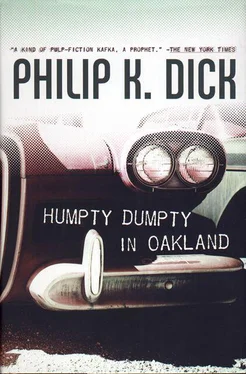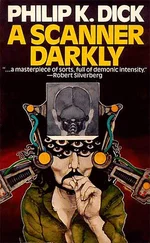He put the record on. It was “When You Wore a Tulip.”
As he listened, Al tried to tell why it sounded so bad. At first he thought that it was because it was so loud. Knight had turned the volume all the way up, and the office rattled and vibrated. But that was not the reason, because Al had often sat in bars listening to loud jukeboxes, and he had never felt this before; he had never been physically sickened by sound in this fashion. At last he realized that it was the piercing quality of the voices. It did something to the fluid of his ears; it made him dizzy and unsteady. Even after the piece ended, the disorder in his system remained; he had to sit gazing down, keeping himself immobile.
The sound had penetrated as pure vibration, as pure disturbance of the air. It was sound reduced to—as Knight had said— cycles per second, reinforced sound emanating from four vocalizing simps who had managed to tune themselves to the exact same pitch, intervals apart, and then this sound had been reinforced by all the modern electronic gadgets, sound chambers and all the rest, so that in the end it bore no relation to what the performers had done, bad as it was. The original sound could have been escaped; but this final product, he realized, would get a person through concrete and sandbags and steel. It would follow him into the bomb-shelter and even the grave. It was, as Knight said, the natural next success for the popular music media; perhaps it would prove to be the final success, the ultimate success. The tune itself had no merit to start with; the singers were amateurs, probably men like Knight himself, well-fed, optimistic, with three evenings a week to devote to barbershop singing after their dinners, after their regular jobs were over. And all, of course, lived in small towns.
“The overtones,” Knight was saying. “The harmonics. Thats what the Budapest String Quartet once in a while achieves. They’re working with fretted instruments.” Standing at the phonograph, he shut the turntable off. “Ever heard anything like it?”
“No,” Al said.
“Not like the old barbershop, is it? Not the Mills Brothers all over again.” Putting the record away, Knight turned toward Al. “What do you think of it?” He eyed Al seriously.
Al said, “It’s the worst crap I ever heard in my entire life.”
The serious expression on Knight’s face did not change in the slightest. “You’re right,” he said. “You put it exactly right. But you’re missing a point. It’s good because it’s so bad. There’s a lot of time and a lot of talent and ingenuity involved in what you heard. A lot of heartbreak and sweat went into producing that sound. It’s there in the sound, too; you can hear it. This stuff wasn’t arrived at by chance; it wasn’t just tossed out for want of something better. It’s not mediocre, Al. This sound is something you’ll remember. You won’t be able to get it out of your mind. Six, ten weeks from now that sound’ll still be there inside your head. It made an impression. A mediocre thing makes no impression; it’s forgotten as soon as it’s donei You think you can forget the Aristotelians singing ‘When You Wore a Tulip’? Don’t kid yourself. You won’t forget it. And that’s given this item something that insures it being a best seller, something without which there is no popularity on the market today. Identity. This sound has identity. When the Aristotelians sing ‘When You Wore a Tulip,’ you know what it is; you couldn’t mistake it for anything else. Yes, it’s bad. It’s so bad that it’s an achievement that ranks with—well, say, with Al Jolson or Johnny Ray or any other of the greats. With the Andrews Sisters.”
“I see,” Al said.
“Do you see?” Knight said. “You use the term ‘bad.’ You call something ‘bad’ that’s going to enter the hearts of Americans everywhere and become a part of their lives. Is that your idea of bad? Something that’ll give pleasure and a moment of relief from the worries and fears of this H-bomb age of ours? That’s a funny idea of what ‘bad’ is, Al. What do you call ‘good’? Something that adds to the fears? Something that makes our lives a little bit harder to bear?”
There was silence.
“These guys,” Knight said, “the Aristotelians—I know them personally; they’re all good friends of mine—got a lot of pleasure out of making this record. They’re not intellectuals. They didn’t go to school; they didn’t read Kant. They’re just good, simple, nice guys who love to get together in the evenings and sing. And we’re going to pass their pleasure around and share it, by pressing their harmonizing. That’s our business. That’s what we’re here for. That’s what you’ll be here for, if you see fit to join us. We’re not trying to change the world. We’re not educators or reformers. We’re supplying pleasure, not instruction. Is that bad?”
Al said, “No. That’s good.”
“Yes, that’s good,” Knight said. “What these boys have done is good, good for people. That’s the only good we know. When professional musicians hear this, they flip. They do. You should see their expressions. It’s worth watching. They know they’re hearing sounds that disappeared hundreds of years ago. Sounds they thought they’d never live to hear. Now, here’s what we’re going to do with you, Al, here at Teach. We’re going to send you up into the small towns that you know so well, and you’re going to sit in on the different barbershop groups until you find us the ones who amount. Then you’re going to get in touch with our A. and R. man, and we’ll get a team up there with an Ampex tape-recorder and some kind of a piece of paper, and we’ll get them down on tape.”
Al said, “You think I have the background for that?”
“For something new,” Knight said, “really new, there’s no such thing as background.”
“I’m no musician,” Al said. “Why don’t you hire a musician?”
“This has nothing to do with musicianship. We’re recording sound. Like sports-car exhausts, which has been one of our bestselling items, incidentally. Sounds Out of Sebring. You know, it’s been proved that beans grow fastest when a record of sports-car exhaust sound is played as a background.”
“What comes next?”
“Symphonic,” Knight said. “They grow well to that, too.”
“I think you’ve got the wrong person,” Al said. “All I know is the used-car business.”
“The job pays five-fifty a month,” Knight said. “Plus gas and oil for the car, naturally. After ninety days, if all works out, the base pay goes up to six, then after six months up to six-fifty. Do you want it, or do you not want it? If not, I’ve got a lot to do.” Knight returned to his desk and reseated himself; he at once placed papers in front of him and began to go over them.
“I’ll take it,” Al said.
It was a better job than he had expected. And at better pay. It was not a salesman’s job after all.
And then he realized that he had been lowballed. Another autodealer’s trick had been worked on him; they had made him think it would be worse than it was, so that when they had broken the actual news to him he had been so happily surprised that he had taken their offer.
Nor was that all. Why had they hired him? Why did they want him? Because he had come from St. Helena. That was the extent of it. He had nothing else to offer that interested them, no talent or experience; only his rural background.
“Suppose it turns out I lied,” he said suddenly. “Suppose I wasn’t born in St. Helena; suppose I was actually born in Chicago.”
Knight said, “We checked up.”
“Is that all you see in me?” Al said. “Isn’t there anything else?” It seemed terribly important.
“You know those little towns,” Knight said. “Point Reyes, Tracy, Los Gatos, Soledad. That’s your element.” He riffled through papers. “And you know those back roads. You won’t get lost. Those county roads are murder. Nothing but gravel and potholes. That’s the kind of roads you grew up on.” He fixed his intent gaze on Al. “Tracking down these barbershop groups in these little towns means a lot of driving. Days of nothing but driving.” Returning to his papers he added, half to himself, “And if your car gets stuck or breaks down you can fix it yourself. You know how to do that.”
Читать дальше










